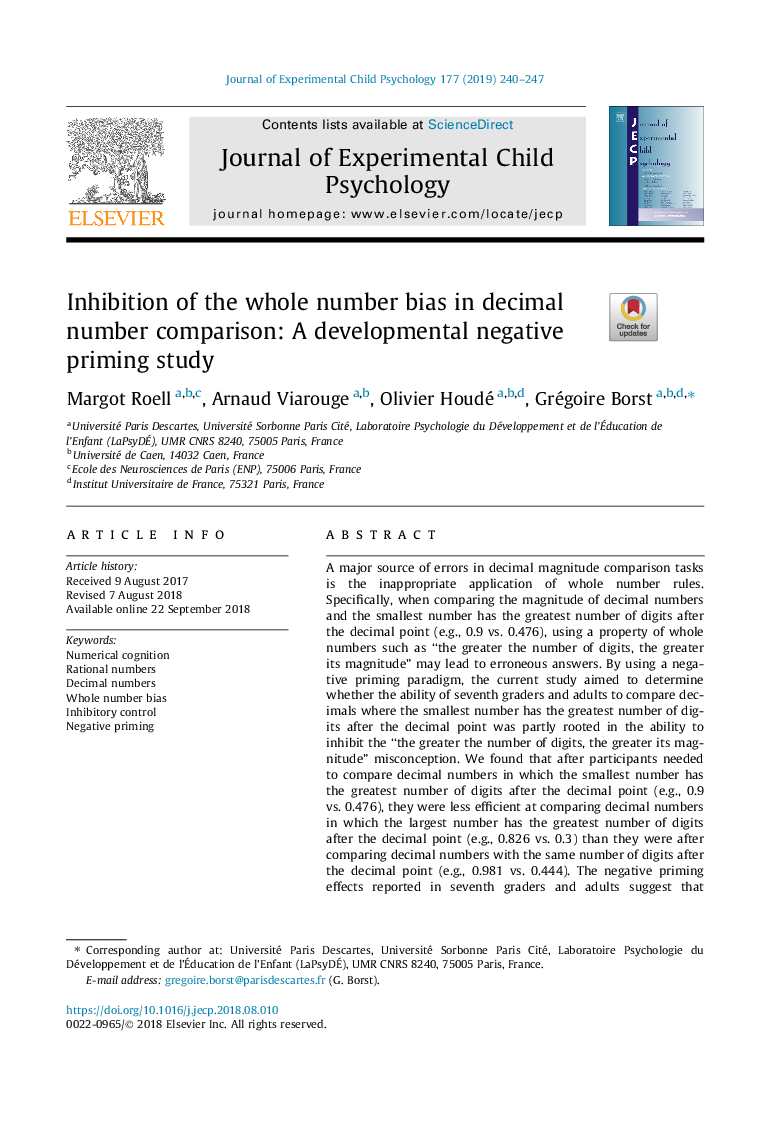| کد مقاله | کد نشریه | سال انتشار | مقاله انگلیسی | نسخه تمام متن |
|---|---|---|---|---|
| 11031383 | 1646010 | 2019 | 8 صفحه PDF | دانلود رایگان |
عنوان انگلیسی مقاله ISI
Inhibition of the whole number bias in decimal number comparison: A developmental negative priming study
ترجمه فارسی عنوان
مهار شمارش کامل عدد در مقایسه عدد دهدهی: یک مطالعه پیشگیری منفی پیشرفت
دانلود مقاله + سفارش ترجمه
دانلود مقاله ISI انگلیسی
رایگان برای ایرانیان
کلمات کلیدی
شناخت عددی، اعداد گویا، اعداد دهدهی، تعصب کامل تعداد، کنترل مهار، پرایمر منفی
موضوعات مرتبط
علوم انسانی و اجتماعی
روانشناسی
روانشناسی رشد و آموزشی
چکیده انگلیسی
A major source of errors in decimal magnitude comparison tasks is the inappropriate application of whole number rules. Specifically, when comparing the magnitude of decimal numbers and the smallest number has the greatest number of digits after the decimal point (e.g., 0.9 vs. 0.476), using a property of whole numbers such as “the greater the number of digits, the greater its magnitude” may lead to erroneous answers. By using a negative priming paradigm, the current study aimed to determine whether the ability of seventh graders and adults to compare decimals where the smallest number has the greatest number of digits after the decimal point was partly rooted in the ability to inhibit the “the greater the number of digits, the greater its magnitude” misconception. We found that after participants needed to compare decimal numbers in which the smallest number has the greatest number of digits after the decimal point (e.g., 0.9 vs. 0.476), they were less efficient at comparing decimal numbers in which the largest number has the greatest number of digits after the decimal point (e.g., 0.826 vs. 0.3) than they were after comparing decimal numbers with the same number of digits after the decimal point (e.g., 0.981 vs. 0.444). The negative priming effects reported in seventh graders and adults suggest that inhibitory control is needed at all ages to avoid errors when comparing decimals where the smallest number has the greatest number of digits after the decimal point.
ناشر
Database: Elsevier - ScienceDirect (ساینس دایرکت)
Journal: Journal of Experimental Child Psychology - Volume 177, January 2019, Pages 240-247
Journal: Journal of Experimental Child Psychology - Volume 177, January 2019, Pages 240-247
نویسندگان
Margot Roell, Arnaud Viarouge, Olivier Houdé, Grégoire Borst,
